I'm Mod Flint and I'll be talking in blue. This blog is just a place to get some ideas, prompts, tropes and other writing related advice. If you have a specific question our ask box is open :]Some of the pronouns I use are they/them and wer/wers ---------------------howdy!!!!! im mod lock and ill be talkin in purple!! my main pronouns are: necro/necrum/necroself and spiri/spiriself, but they/them works too!!!-------------------------------------------------------------------------------------Hey! I'm Mod Sky and I'll be talking in pink! My pronouns are she/they!
Don't wanna be here? Send us removal request.
Text
did you know? there is a type of metal chariot, powered by the bone-ichor of ancient dragons, that you can use to access—and quickly traverse—a labyrinthine realm of desolate, pitch-black stone known to scientists as “the american highway system”
56K notes
·
View notes
Text
Did I daydream this, or was there a website for writers with like. A ridiculous quantity of descriptive aid. Like I remember clicking on " inside a cinema " or something like that. Then, BAM. Here's a list of smell and sounds. I can't remember it for the life of me, but if someone else can, help a bitch out <3
115K notes
·
View notes
Text
Why your story sucks
Read this if you think your story sucks.
Here are the most common reasons why it might feel like things are falling flat in your novel, or just not working out the way you want them to.
You don’t have a clear message You don’t have a grasp on what your story question is and how you’re going to answer it, or what themes you’re exploring beyond the plot.
You’ve lost sight of your character motivations This happens often, to experienced writers too. Sometimes you’re just not thinking in a way that puts your character motivations in the top priorities - where they should always be.
You rushed in without a plot structure Being a discovery writer is all good and way, pantsing your way through a story can be done, but even so, you should at least have a vague idea of what your biggest plot points are, so you don’t completely lose the middle.
You’re obsessed with the plot On the other tip of the scale, you might be obsessing over following every little plot thread you’ve laid out, that writing just isn’t fun anymore, and your characters are doing things for the sake of following your plot.
You’re not taking time to discover your world Allowing yourself some creative freedom from time to time is a great way to spark innovative scenes in your novel. Explore what the world you created has to offer, and let your characters do their own thing once in a while.
Did you hear about my group coaching for writers? I’m teaming up with Novlr to bring you a 6-month program where you’ll learn all the elements of creative writing and work to complete your first draft!
Join the waitlist today through the link HERE!
1K notes
·
View notes
Text
thinking again about TvTropes and how it’s genuinely such an amazing resource for learning the mechanics of storytelling, honestly more so than a lot of formally taught literature classes
reasons for this:
basically TvTropes breaks down stories mechanically, using a perspective that’s not…ABOUT mechanics. Another way I like to put it, is that it’s an inductive, instead of deductive, approach to analyzing storytelling.
like in a literature or writing class you’re learning the elements that are part of the basic functioning of a story, so, character, plot, setting, et cetera. You’re learning the things that make a story a story, and why. Like, you learn what setting is, what defines it, and work from there to what makes it effective, and the range of ways it can be effective.
here’s the thing, though: everyone has some intuitive understanding of how stories work. if we didn’t, we couldn’t…understand stories.
TvTropes’s approach is bottom-up instead of top-down: instead of trying to exhaustively explore the broad, general elements of story, it identifies very small, specific elements, and explores the absolute shit out of how they fit, what they do, where they go, how they work.
Every TvTropes article is basically, “Here is a piece of a story that is part of many different stories. You have probably seen it before, but if not, here is a list of stories that use it, where it is, and what it’s doing in those stories. Here are some things it does. Here is why it is functionally different than other, similar story pieces. Here is some background on its origins and how audiences respond to it.”
all of this is BRILLIANT for a lot of reasons. one of the major ones is that the site has long lists of media that utilizes any given trope, ranging from classic literature to cartoons to video games to advertisements. the Iliad and Adventure Time ARE different things, but they are MADE OF the same stuff. And being able to study dozens of examples of a trope in action teaches you to see the common thread in what the trope does and why its specific characteristics let it do that
I love TvTropes because a great, renowned work of literature and a shitty, derivative YA novel will appear on the same list, because they’re Made Of The Same Stuff. And breaking down that mental barrier between them is good on its own for developing a mechanical understanding of storytelling.
But also? I think one of the biggest blessings of TvTropes’s commitment to cataloguing examples of tropes regardless of their “merit” or literary value or whatever…is that we get to see the full range of effectiveness or ineffectiveness of storytelling tools. Like, this is how you see what makes one book good and another book crappy. Tropes are Tools, and when you observe how a master craftsman uses a tool vs. a novice, you can break down not only what the tool is most effective for but how it is best used.
In fact? There are trope pages devoted to what happens when storytelling tools just unilaterally fail. e.g. Narm is when creators intend something to be frightening, but audiences find it hilarious instead.
On that note, TvTropes is also great in that its analysis of stories is very grounded in authors, audiences, and culture; it’s not solely focused on in-story elements. A lot of the trope pages are categories for audience responses to tropes, or for real-world occurrences that affected the storytelling, or just the human failings that creep into storytelling and affect it, like Early Installment Weirdness. There are categories for censorship-driven storytelling decisions. There are “lineages” of tropes that show how storytelling has changed over time, and how audience responses change as culture changes. Tropes like Draco in Leather Pants or Narm are catalogued because the audience reaction to a story is as much a part of that story—the story of that story?—as the “canon.”
like, storytelling is inextricable from context. it’s inextricable from how big the writers’ budget was, and how accepting of homophobia the audience was, and what was acceptable to be shown on film at the time. Tropes beget other tropes, one trope is exchanged for another, they are all linked. A Dead Horse Trope becomes an Undead Horse Trope, and sometimes it was a Dead Unicorn Trope all along. What was this work responding to? And all works are responding to something, whether they know it or not
67K notes
·
View notes
Text
tricky words I always see misspelled in fics: a guide
Viscous/vicious – Viscous is generally used to describe the consistency of blood or other thick liquids. Vicious is used to describe something or someone who is violent.
Piqued/Peaked/Peeked – To pique someone’s interest is to catch or tease their attention. When something peaks, it reaches its total height or intensity. To peek (at) something is to look briefly, or glance.
Discrete/Discreet – this is a tough one. Discrete means to be separate, or distinct, i.e., two discrete theories. Conversely, when someone is discreet, they are being secretive or cautious to avoid attention.
Segue/Segway – one is a transition between things, the other is a thing you can ride at the park and definitely fall off of.
Conscious/Conscience/Conscientious – to be conscious is to be awake, i.e., not unconscious, or to be aware of something. Your conscience is the little voice in your head telling you not to eat the entire pint of ice cream. Finally, to be conscientious is to be good, to do things thoroughly, to be ruled by an inner moral code.
Hope this helped! Please add more if you think of them!
50K notes
·
View notes
Text
WEBSITES FOR WRITERS {masterpost}
E.A. Deverell - FREE worksheets (characters, world building, narrator, etc.) and paid courses;
Hiveword - Helps to research any topic to write about (has other resources, too);
BetaBooks - Share your draft with your beta reader (can be more than one), and see where they stopped reading, their comments, etc.;
Charlotte Dillon - Research links;
Writing realistic injuries - The title is pretty self-explanatory: while writing about an injury, take a look at this useful website;
One Stop for Writers - You guys... this website has literally everything we need: a) Description thesaurus collection, b) Character builder, c) Story maps, d) Scene maps & timelines, e) World building surveys, f) Worksheets, f) Tutorials, and much more! Although it has a paid plan ($90/year | $50/6 months | $9/month), you can still get a 2-week FREE trial;
One Stop for Writers Roadmap - It has many tips for you, divided into three different topics: a) How to plan a story, b) How to write a story, c) How to revise a story. The best thing about this? It's FREE!
Story Structure Database - The Story Structure Database is an archive of books and movies, recording all their major plot points;
National Centre for Writing - FREE worksheets and writing courses. Has also paid courses;
Penguin Random House - Has some writing contests and great opportunities;
Crime Reads - Get inspired before writing a crime scene;
The Creative Academy for Writers - "Writers helping writers along every step of the path to publication." It's FREE and has ZOOM writing rooms;
Reedsy - "A trusted place to learn how to successfully publish your book" It has many tips, and tools (generators), contests, prompts lists, etc. FREE;
QueryTracker - Find agents for your books (personally, I've never used this before, but I thought I should feature it here);
Pacemaker - Track your goals (example: Write 50K words - then, everytime you write, you track the number of the words, and it will make a graphic for you with your progress). It's FREE but has a paid plan;
Save the Cat! - The blog of the most known storytelling method. You can find posts, sheets, a software (student discount - 70%), and other things;
I hope this is helpful for you!
(Also, check my blog if you want to!)
80K notes
·
View notes
Text
Resources For Describing Characters
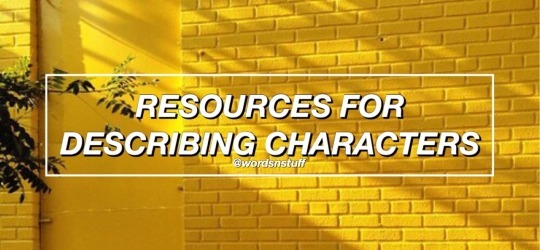
Physical Appearance
Arms
Athletic Build
Back
Butts
Cheeks
Chest
Chins
Curvy Build
Ears
Eyebrows
Eyes
Faces
Facial Hair
Feet
Fingernails
Fingers
Hair
Hands
Head
Hips
Jaws
Knees
Legs
Lips
Muscular Build
Neck
Noses
Shoulders
Slender Build
Sickly Build
Skin
Stocky Build
Stomach
Teeth
Toenails
Toes
Underweight Build
Character Traits
Affectionate
Ambitious
Bossy
Brave
Calm
Cautious
Charismatic
Clever
Conceited
Courageous
Creative
Critical
Curious
Determined
Diplomatic
Dishonest
Disorganized
Eccentric
Excitable
Friendly
Funny
Generous
Glamorous
Guarded
Honest
Impulsive
Independent
Intelligent
Just
Kind
Loyal
Manipulative
Mature
Modest
Mysterious
Naïve
Optimistic
Prejudiced
Persistent
Proper
Responsible
Sensitive
Sentimental
Serious
Shy
Reckless
Stingy
Stubborn
Talented
Thoughtful
Thrifty
Visionary
Wise
Witty
Worry Wart
Wounded
Talents & Skills
A Knack for Languages
A Knack for Making Money
A Way with Animals
Archery
Astral Projection
Astrological Divination
Baking
Basic First Aid
Blending In
Carpentry
Charm
ESP (Clairvoyance)
Empathy
Enhanced Hearing
Enhanced Sense of Smell
Enhanced Taste Buds
Farming
Fishing
Foraging
Gaining the Trust of Others
Gaming
Gardening
Good Listening Skills
Haggling
Herbalism
Hospitality
Hot-Wiring a Car
High Pain Tolerance
Knife Throwing
Knowledge of Explosives
Lip-Reading
Lying
Making People Laugh
Mechanically Inclined
Mentalism
Mimicking
Multitasking
Musicality
Organization
Parkour
Photographic Memory
Predicting the Weather
Promotion
Psychokinesis
Reading People
Regeneration
Repurposing
Sculpting
Self-Defense
Sewing
Sharpshooting
Sleight-of-Hand
Strategic Thinking
Strong Breath Control
Super Strength
Survival Skills
Swift-footedness
Talking With The Dead
Throwing One’s Voice
Whittling
Wilderness Navigation
Wrestling
Elemental Abilities
Miscellaneous
Voices
Voice Types
Speech Patterns
Speech Impediment
List of Character Flaws
List of Archetypes
Hairstyles
Describing Body Types & How They Move Around
Secrets To Give Your Character
Support Wordsnstuff!
Request A Writing Help Post/Themed Playlist/Writing Tips!
Send Me Poetry To Feature On Our Instagram!
Receive Updates & Participate In Polls On Our Twitter!
Like us and share on Facebook!
Read More On Our Masterlist & See our Frequently Asked Questions!
Tag What You Want Me To See With #wordsnstuff!
Participate in monthly writing challenges!
84K notes
·
View notes
Text
Very generally speaking, when you see a black man in a piece of media, be it tv show, movie, video game, etc. there’s something you often see a lot of writers do. To go against the stereotype of black men (and black people in general) being dumb and lazy, you’ll see this black male character being smart and an achiever. 
The Black Nerd. A common character type, the nerd will always be very interested in all things nerdy: science, video games, mathematics, etc. In an continued effort to combat stereotypes, the Black Nerd will be lack athleticism, probably being asthmatic (the nerdiest of conditions). The Black Nerd will dress smartly, suspenders and bow ties. They’ll always talk smart too, using proper English with complex words.
Now, I don’t have a problem with a black character being a nerd, indeed black people are a people; we aren’t all the same and we all have varying personalities. The problem I have is that too often we see a distinct disconnect between Blackness and the Black Nerd. The Black Nerd doesn’t listen to hip hop or rap, only classical music. The Black Nerd only has white friends, the only other black characters are into not nerdy stuff. The Black Nerd never ever uses AAVE at any time in any context.
And again I must say that Black people, not being a monolith, there are no hard fast rules to being Black. I’m more than sure there are Black people like what I’ve described above, I’m not saying it’s impossible; what I’m getting at is that the only Black Nerd we see. There are Black Nerds that play basketball, that bump Kendrick Lamar, and use AAVE since it’s an ever changing dialect. I’m just saying there’s no one way of being a nerd and no one way of being Black.
4K notes
·
View notes
Photo
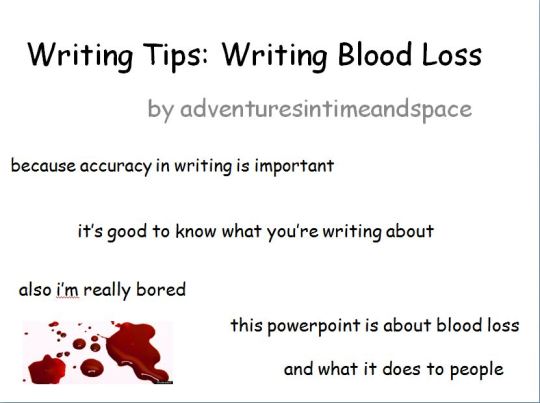
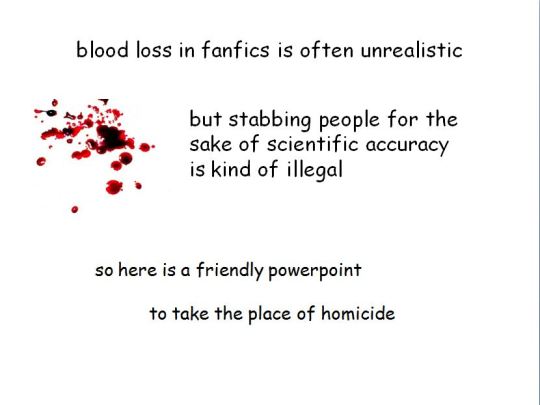


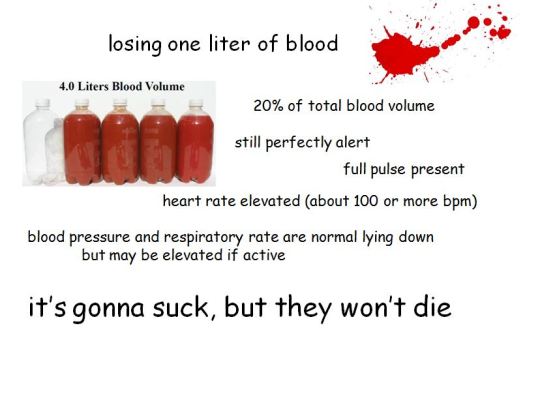
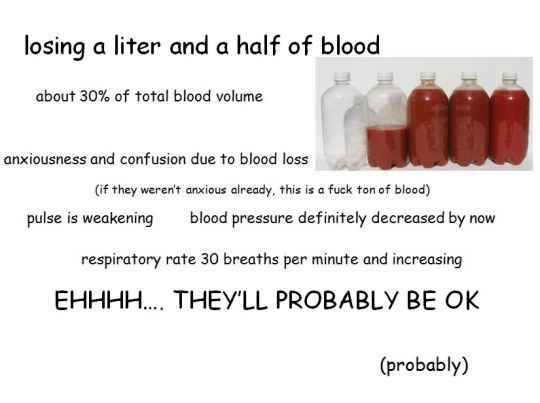
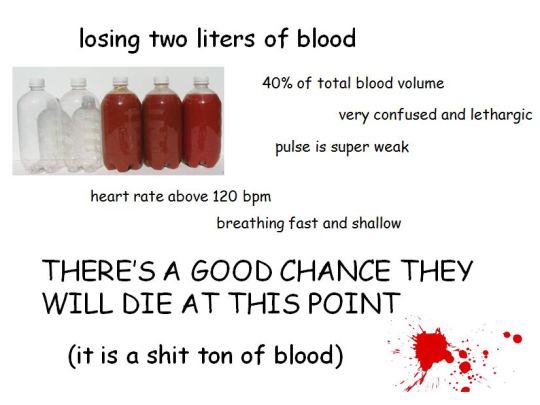
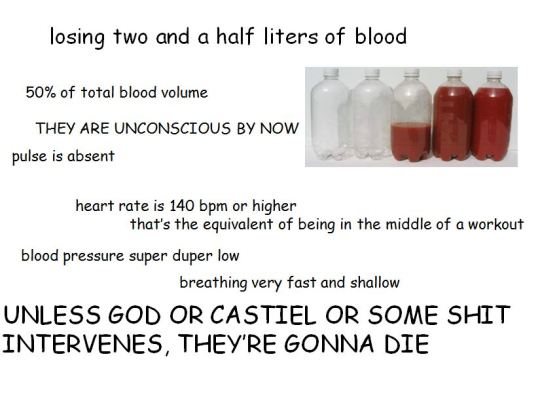
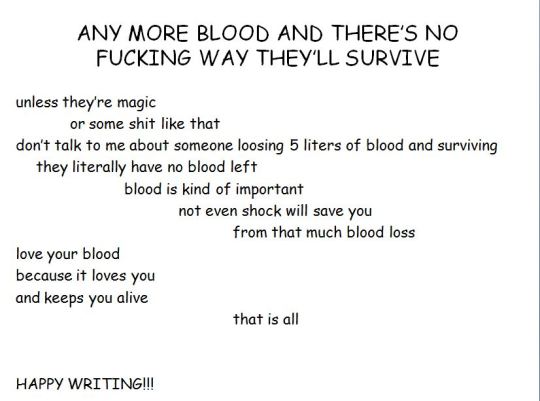
Here are some scientific facts about blood loss for all you psychopaths writers out there.
287K notes
·
View notes
Text
5 things your character can't do while speaking
Choke. Just think about it, seriously. Think about what choking is and imagine speaking while it’s happening. That would fuckin’ hurt, man.
Hiss. Look, it’s just not possible, okay? No matter how “evil” you want your character to seem.
Snarl. Animals snarls. The Beast from Beauty and the Beast snarls. The Hulk snarls. You know who doesn’t snarl? PEOPLE WHEN THEY’RE SPEAKING.
Shriek. Come on, 99% of the time, “shriek” is not the word you want.Let’s face it: if you put an exclamation point at the end of the sentence, your reader gets the picture. Don’t bring to mind banshees and screaming toddlers.
Sneer. I’m not even going to bother explaining this one. “SNEER” ISN’T EVEN A SOUND.
148K notes
·
View notes
Text
just a reminder:
a black girl character growing her hair out long breaks more stereotypes than a black girl character having short hair
a black girl character getting to be soft and fragile breaks more stereotypes than a black girl character being strong all the time
a black girl character being protected and comforted by others breaks more stereotypes than a black girl character having no one to look out for her but herself
a black girl character being considered pretty or cute by other characters breaks more stereotypes than a black girl character being considered unattractive
not everything that is empowering for white girls is empowering for black girls
the sexism we face overlaps, but it is not the same
265K notes
·
View notes
Text
By the way, if you're intimidated about whether your writing is good, keep in mind that "show, don't tell" is best to reserve for the second draft. In the first draft you can absolutely just explain everything as obvious statements. You can even highlight the obvious statements into some sort of a "weave into the story/fix at some point" sort of thing, you could even keep a scrap basket on a different document where you can check into.
If your first draft says, "Character A is reckless by nature", you can highlight it, and then when your second draft has a good spot for some kind of "filler", write a small scene where A acts reckless in some way that doesn't end up altering the plot. In an ideal situation, you could do this with multiple characters at the same time, showing character B (who was stated to be caring and concerned of others) stop the reckless thing. Don't worry about ~not progressing the plot~ here, illustrating character nature is important too.
You can explain in the middle of the first draft that someone is a failed electrician who dropped out of it because of a combination of how terrible he is at improvising, and his determination to try doing so anyway. Then, on the second draft, you can introduce the same guy by other characters being concerned whether he can be trusted to be left alone with a microwave. It flows naturally.
327 notes
·
View notes
Text
the “sexy lamp test” but for disabled folks: if you can replace your disabled character with a beloved pet dog that needs an expensive surgery to survive then you have to throw out your manuscript
23K notes
·
View notes
Text
I've said this before but unwanted constructive criticism is completely useless because you have no idea what the author actually wants to improve on or what their goal for their writing was.
I've gotten "constructive criticism" for disjointed writing when my goal was to show how jumbled the protagonist's mental state was. I've been told that my formating was inconsistent on a fic where I was experimenting with formating to try different perspectives and new ways of telling a story.
If you don't know the author's intent and they haven't told you what they feel they need to work on, there is no way for you to offer constructive criticism. It's that simple.
6K notes
·
View notes
Text
I've been thinking about the way women's anger is portrayed in media, especially in comparison to men's anger. Men's anger, at least more so than women's anger, is usually presented by the narrative as justified or a reasonable response to his situation. Even when it's not, for example in the case of a man being an antagonist, his anger if it's not justified is at least portrayed as powerful, as serious, as something to be reckoned with.
Most of the portrayals of female anger we see in media though is just women being shrill nagging killjoys, something that's obnoxious and annoying for the other characters but not to be taken seriously, only for the (typically male but sometimes other female) characters to put her back in her place as a solution to her being a shrill nagging killjoy. Think about it, the shrill nagging housewife, the shushing librarian, the bossy but whiny sister, the uptight prim and proper fuddy duddy matronly figure like a nanny or school teacher.
And it goes without saying there's an extra layer to this for WoC, the angry ghetto Black woman, the spicy and feisty Latina, the dragon lady. And even though there's obviously racism in the way MoC's anger is portrayed, when you compare MoC's anger portrayals in media alongside WoC's you'll see that MoC more than WoC get to have their anger portrayed as serious and justifiable while WoC are just portrayed as being obnoxious, hysterical, and irrational in their anger.
Or an extra layer of homophobia if you're a lesbian, think of the "angry man hating lesbian" stereotype, and this is often weaponized against lesbians who try to speak out against homophobia and misogyny.
Whether or not it has the extra layer of racism and/or homophobia added on women's anger is generally portrayed as silly, hysterical, obnoxious but more annoying to deal with than powerful or serious or justified. And again, most importantly, women's anger is presented as something for the other characters, generally but not always male characters, to dismiss then put her back into her place. The shrill nagging housewife here to ruin your fun needs to be shut up so you as her husband or child can keep on having your fun, ect. ect.
And this is really important to discuss and dissect. Because it shapes how we perceive and react to women and their anger in real life. It means a woman is more likely to stay quiet and not stand up for herself because she doesn't want to be just another shrill nag ruining everyone else's fun, she can't say anything to her husband or children not picking up after themselves or else she'll be another shrill nagging housewife, she just needs to quietly and obediently pick up after them. She can't say anything to her neighbor blasting music so loud that it's making her have a hard time focusing on studying because that would make her the uptight shushing librarian. She can't speak up about that microaggression or else that would make her the feisty Latina or the angry ghetto Black woman. She can't call out that misogynistic and/or homophobic remark her roommate's boyfriend just made or else she'll be an angry man hating lesbian. Women see these archetypes of female anger in the media and they internalize it.
Likewise, and most importantly, it's going to shape how men (and of course women with internalized misogyny) respond to women's anger. When a woman is reasonably angry at him for something justifiable, he sees her anger as silly, as shrill, as obnoxious, but otherwise something for him to dismiss and shut her up by besting her like the male protags in his favorite show do when they're being nagged by a shrill housewife or shushed by an uptight matronly figure. And of course when this is the response men have to women's anger, it makes it even harder for women to feel comfortable and justified in speaking up and asserting their boundaries when they have genuine grievances.
2K notes
·
View notes
Text
Writing Tips
Punctuating Dialogue
✧
➸ “This is a sentence.”
➸ “This is a sentence with a dialogue tag at the end,” she said.
➸ “This,” he said, “is a sentence split by a dialogue tag.”
➸ “This is a sentence,” she said. “This is a new sentence. New sentences are capitalized.”
➸ “This is a sentence followed by an action.” He stood. “They are separate sentences because he did not speak by standing.”
➸ She said, “Use a comma to introduce dialogue. The quote is capitalized when the dialogue tag is at the beginning.”
➸ “Use a comma when a dialogue tag follows a quote,” he said.
“Unless there is a question mark?” she asked.
“Or an exclamation point!” he answered. “The dialogue tag still remains uncapitalized because it’s not truly the end of the sentence.”
➸ “Periods and commas should be inside closing quotations.”
➸ “Hey!” she shouted, “Sometimes exclamation points are inside quotations.”
However, if it’s not dialogue exclamation points can ask be “outside”!
➸ “Does this apply to question marks too?” he asked.
If it’s not dialogue, can question marks be “outside”? (Yes, they can.)
➸ “This applies to dashes too. Inside quotations, dashes typically express—“
“Interruption” — but there are situations dashes may be outside.
➸ “You’ll notice that exclamation marks, question marks, and dashes do not have a comma after them. Ellipses don’t have a comma after them either…” she said.
➸ “My teacher said, ‘Use single quotation marks when quoting within dialogue.’”
➸ “Use paragraph breaks to indicate a new speaker,” he said.
“The readers will know it’s someone else speaking.”
123K notes
·
View notes
